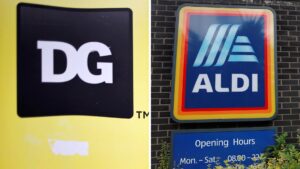More Shoppers Buy Store Brands, Eating Into Big Food Companies’ Sales

Cost-conscious consumers are buying more store brands at the supermarket, raising pressure on big food companies that are dealing with their own rising costs.
Lower-cost oatmeal, pickles, granola bars and coffee, made by companies such as
TreeHouse Foods Inc.
and sold by retailers like
Walmart Inc.
and
Kroger Co.
, are gaining traction with consumers for the first time since the pandemic began, according to market-research firm IRI.
Store-branded food and beverages gained 1 percentage point of market share in terms of sales dollars over the four weeks that ended July 10, the most recent data available, according to IRI. Store brands’ share of such spending is now 21.6%, surpassing 2019 levels, after losing ground to brand-name products throughout the pandemic.
The shift, which began in March with the onset of rising gas prices, marks a reversal from the past two years, when big food companies like
Kraft Heinz Co.
and
General Mills Inc.
captured more of consumers’ dollars as private label manufacturers struggled with supply-chain problems.
In recent weeks, store brands have gained sales by offering bigger discounts than name brands, according to executives and industry analysts, and by more quickly restocking shelves after struggling to keep up with demand during the pandemic. Store brands typically cost less because the retailers and manufacturers don’t have added marketing costs, or name brands’ breadth of sizes and flavors.
“With all the inflation, private label is the best deal it has ever been,” said
Steve Oakland,
chief executive of TreeHouse Foods, the largest private-brand manufacturer in the country. Sales of grocery-store-branded items have gained momentum throughout the past four months, he said.
Executives from
Conagra Brands Co.
, General Mills and
J.M. Smucker Co.
have acknowledged the shift, but said they aren’t worried.
“While private label is gaining some share more broadly in food, we have not seen notable migration toward private label in [our categories],” said Conagra CEO
Sean Connolly
on an earnings call last week.
Other food giants could weigh in on the impact of store brands next week, with Kraft Heinz Co.,
Coca-Cola Co.
,
Mondelez International Inc.,
PLC and
Nestle SA
all scheduled to report quarterly results.
Kathryn Stewart, a church music director in Bartlesville, Okla., said she’s found that when she switches to a store brand, the difference in taste and texture is minimal, but the savings are significant.
“Pennies add up,” Ms. Stewart said. “I feel a small thrill of sticking it to ‘big cereal’ when I buy the store brand.”
About 70% of consumers say store brands factor into where they shop for groceries, said Aimee Becker, executive vice president of global brand solutions for private-label consulting company Daymon. Historically, once people switch from national brands to store brands, they tend not to go back, she added.
For decades, private-label grocery products such as Kroger’s Simple Truth, Whole Foods Market’s 365 or
Costco Wholesale Corp.’s
Kirkland have chipped away at sales of big brands. In the years leading up the Covid-19 pandemic, sales of store-branded products grew at twice the rate of name-brand products.
When the pandemic sickened workers and disrupted operations, TreeHouse and other private-label manufacturers struggled to make enough products. Since name brands make more varieties of sizes and flavors, they were able to cut varieties to increase efficiency and keep up production. Private label manufacturers had less flexibility, executives said, and as a result they ran out of stock more often. With restaurant dining limited and government stimulus payments padding their bank accounts, consumers proved willing to splurge on name brands at the grocery store, TreeHouse’s Mr. Oakland said.
Kroger CEO
Rodney McMullen
said that in the quarter ended May 21, sales of Kroger’s own brand rose faster than national brands and that 92% of households purchased at least one of these products.
Southeastern Grocers Inc., which runs Winn-Dixie and other regional supermarket chains, said that shoppers are now choosing its line of products over name brands for cheese, eggs, salty snacks, coffee and more. The store-branded products on average are 20% less expensive than name brands, said
Dewayne Rabon,
Southeastern Grocers’ chief merchandising officer.
As national brands continue to raise prices to offset inflation, and the economy shows signs of a downturn, food industry analysts say some companies are especially vulnerable to the rise of generics.
analysts projected last month that Smucker, General Mills, Kraft Heinz,
Campbell Soup Co.
and Conagra face particular risk of losing sales to store brands. These companies have raised prices faster than their store-brand rivals for their coffee, cereal, deli meat, soup and frozen vegetables, Morgan Stanley said.
The price gap between store brands and national brands has recently widened for the first time since the start of the pandemic, Morgan Stanley said, because national brands raised prices more this year to offset their own rising costs. Now, private-label products are 30% cheaper on average, she said.
General Mills’
Jon Nudi,
president of North America retail, said in late June that during previous economic downturns, General Mills’ brands have maintained their market share, while less popular competitors lose out to private label. “We obviously watch very closely—how branded players are performing, how private label is performing,” he said.
Smucker CEO
Mark Smucker
in early June said that consumers haven’t heavily switched to cheaper options in the jam supplier’s main product lines. In the latest quarter, the company said, 86% of its brands maintained or gained market share.

Some grocery shoppers said that switching to store brands can make a significant difference for household budgets.
Photo:
Richard B. Levine/Zuma Press
Campbell Soup Chief Executive
Mark Clouse
said in early June that even in categories where private label has pressured Campbell’s market share, such as condensed soup, Campbell’s sales are still growing because canned soup tends to do well during times of economic uncertainty.
Kraft Heinz CEO
Miguel Patricio
said that the Oscar Mayer and Capri Sun supplier significantly reduced its exposure to competing private-label brands by selling its Planters nut business and most of its cheese business.
TreeHouse’s Mr. Oakland, who worked at Smucker for decades, said he expects big brands to defend their sales. When costs have climbed in the past, branded food makers have switched packaging materials or ingredient suppliers to cut expenses, but the supply-chain challenges arising from Covid-19 and Russia’s war in Ukraine may limit such options now, he said.
Jonathan Greenway, head of the consumer products practice at the consulting firm AlixPartners, said big food makers, such as Conagra, are working on ways to combat the shift toward private label. “It’s a constant struggle for brand managers. I’ve been there before,” he said, recalling his work at
during the last recession. “That’s what keeps you up at night.”
Some grocery shoppers, facing the highest rate of food inflation in four decades on top of soaring gas and rent costs, said that switching to store brands can make a significant difference for household budgets.
Lashonda Saverson, who lives with her husband in the Washington, D.C., metro area, said she is choosing store brands, buying in bulk and freezing food to save money. She said she tends to buy the same items every week, and notices the rising prices.
“How high is bacon going to get?” Ms. Saverson said. “Bacon is a necessity in my house. I never thought I would feel so poor that I couldn’t afford bacon, and we almost got there.”
Write to Annie Gasparro at annie.gasparro@wsj.com
Copyright ©2022 Dow Jones & Company, Inc. All Rights Reserved. 87990cbe856818d5eddac44c7b1cdeb8








